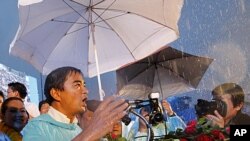Millions of voters in Thailand on Sunday are making a critical choice for the future direction of their country.
There are about 40 political parties competing in the election.
The contest is mainly between the ruling Democrats of Prime Minister Abhisit Vejjajiva and the opposition Pheu Thai, led by Yingluck Shinawatra, the younger sister of former Prime Minister Thaksin Shinawatra.
Most opinion polls leading up to the election indicated Pheu Thai had a slight lead, but that many Thais were also undecided.
Early voting in Bangkok was largely calm as voters assembled at schools and government buildings to cast their ballots.
After casting her vote Sunday morning at a local school in Bangkok’s Nawamin sub-district, Ms.Yingluck told journalists she would have a better idea of her party’s chances in the afternoon after voting ends.
"I think let's see from the exit poll better, yes. And, I will give you more detail after that, thanks," Yingluck said.
The vote is seen as a test of Thailand’s commitment to democracy.
Yingluck is widely viewed as a proxy for her brother who, despite being popularly elected twice, was ousted by the military in 2006 over concerns he was growing too powerful.
Thaksin’s critics say he was corrupt, authoritarian, and disloyal to Thailand’s revered monarchy. He denies all the charges and in 2008 fled into exile to avoid a jail sentence for corruption.
Nonetheless, in the past few general elections Thailand voted overwhelmingly for parties aligned with Thaksin.
But controversial court orders dissolved those governments for election fraud and banned their leaders from office for five years.
Political wrangling brought Prime Minister Abhisit to power by parliamentary vote, raising accusations from Thaksin’s supporters that Bangkok elites conspired to remove their elected leaders.
If his Democrats win a majority it would give Abhisit’s government the popular legitimacy it has lacked.
Abhisit voted at the Sawasdee Wittaya school in downtown Bangkok. After casting his ballot, he told a crowd of journalists that he is urging all Thai’s to come out to exercise their rights.
He says come out to vote as much as possible because this election is very important to the future of the country.
Thailand has seen sporadic street protests and violence in a power struggle between Abhisit’s backers among the traditional elite and the military and Thaksin’s mainly working class followers.
The fight culminated in street battles last year between soldiers and armed elements among Thaksin’s Red Shirt supporters that left 90 people dead, most of them civilians.
Rioting protesters looted and set fire to more than thirty buildings, gutting a historic cinema and a major shopping mall.
If neither side wins an outright majority Sunday the party with the most votes has the first chance to form a coalition government with smaller parties. If they are unable to reach a power-sharing deal the party with the second largest number of votes can try.
Observers worry if the results are not accepted there could be further clashes, perhaps more deadly and damaging.
Unrest could once again give the military reason to intervene. Thailand has had 18 coups or attempted coups since becoming a constitutional monarchy in 1932.
Thailand Votes for Next Leaders

Election comes amid concerns for stability in the divided country



